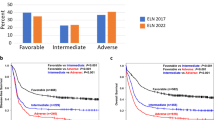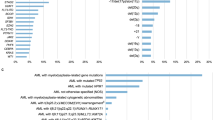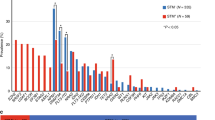Abstract
Acute myeloid leukemia (AML) is a clinically heterogeneous disease, with a 5-year disease-free survival (DFS) ranging from under 10% to over 70% for distinct groups of patients. At our institution, cytarabine, etoposide and busulfan are used in first or second remission patients treated with a two-step approach to autologous stem cell transplantation (ASCT). In this study, we tested the hypothesis that polymorphisms in the pharmacokinetic and pharmacodynamic pathway genes of these drugs are associated with DFS in AML patients. A total of 1659 variants in 42 genes were analyzed for their association with DFS using a Cox-proportional hazards model. One hundred and fifty-four genetically European patients were used for the primary analysis. An intronic single nucleotide polymorphism (SNP) in ABCC3 (rs4148405) was associated with a significantly shorter DFS (hazard ratios (HR)=3.2, P=5.6 × 10−6) in our primary cohort. In addition, a SNP in the GSTM1-GSTM5 locus, rs3754446, was significantly associated with a shorter DFS in all patients (HR=1.8, P=0.001 for 154 European ancestry; HR=1.7, P=0.028 for 125 non-European patients). Thus, for the first time, genetic variants in drug pathway genes are shown to be associated with DFS in AML patients treated with chemotherapy-based autologous ASCT.
Similar content being viewed by others
Log in or create a free account to read this content
Gain free access to this article, as well as selected content from this journal and more on nature.com
or
References
Daver, N. & Cortes, J. Molecular targeted therapy in acute myeloid leukemia. Hematology 17 (Suppl 1), S59–S62 (2012).
Patel, J. P., Gonen, M., Figueroa, M. E., Fernandez, H., Sun, Z., Racevskis, J. et al. Prognostic relevance of integrated genetic profiling in acute myeloid leukemia. N. Engl. J. Med. 366, 1079–1089 (2012).
Buccisano, F., Maurillo, L., Del Principe, M. I., Del Poeta, G., Sconocchia, G., Lo-Coco, F. et al. Prognostic and therapeutic implications of minimal residual disease detection in acute myeloid leukemia. Blood 119, 332–341 (2012).
Martelli, M. P., Sportoletti, P., Tiacci, E., Martelli, M. F. & Falini, B. Mutational landscape of AML with normal cytogenetics: Biological and clinical implications. Blood Rev. 27, 13–22 (2013).
Kroger, N., Brand, R., van Biezen, A., Cahn, J. Y., Slavin, S., Blaise, D. et al. Autologous stem cell transplantation for therapy-related acute myeloid leukemia and myelodysplastic syndrome. Bone Marrow Transplant. 37, 183–189 (2006).
Novitzky, N., Thomas, V., du Toit, C. & McDonald, A. Is there a role for autologous stem cell transplantation for patients with acute myelogenous leukemia? A retrospective analysis. Biol. Blood Marrow Transplant. 17, 875–884 (2011).
Linker, C. A., Damon, L. E., Ries, C. A., Navarro, W. A., Case, D. & Wolf, J. L. Autologous stem cell transplantation for advanced acute myeloid leukemia. Bone Marrow Transplant. 29, 297–301 (2002).
Linker, C. A., Owzar, K., Powell, B., Hurd, D., Damon, L. E., Archer, L. E. et al. Auto-SCT for AML in second remission: CALGB study 9620. Bone Marrow Transplant. 44, 353–359 (2009).
Linker, C. A., Ries, C. A., Damon, L. E., Sayre, P., Navarro, W., Rugo, H. S. et al. Autologous stem cell transplantation for acute myeloid leukemia in first remission. Biol. Blood Marrow Transplant. 6, 50–57 (2000).
Price, A. L., Patterson, N. J., Plenge, R. M., Weinblatt, M. E., Shadick, N. A. & Reich, D. Principal components analysis corrects for stratification in genome-wide association studies. Nat. Genet. 38, 904–909 (2006).
Yang, J., Bogni, A., Schuetz, E. G., Ratain, M., Dolan, M. E., McLeod, H. et al. Etoposide pathway. Pharmacogenet. Genomics 19, 552–553 (2009).
Li, L., Schaid, D. J., Fridley, B. L., Kalari, K. R., Jenkins, G. D., Abo, R. P. et al. Gemcitabine metabolic pathway genetic polymorphisms and response in patients with non-small cell lung cancer. Pharmacogenet. Genomics 22, 105–116 (2012).
Hassan, M. & Andersson, B. S. Role of pharmacogenetics in busulfan/cyclophosphamide conditioning therapy prior to hematopoietic stem cell transplantation. Pharmacogenomics 14, 75–87 (2013).
Abbasi, N., Vadnais, B., Knutson, J. A., Blough, D. K., Kelly, E. J., O'Donnell, P. V. et al. Pharmacogenetics of intravenous and oral busulfan in hematopoietic cell transplant recipients. J. Clin. Pharmacol. 51, 1429–1438 (2011).
Lamba, J. K. Genetic factors influencing cytarabine therapy. Pharmacogenomics 10, 1657–1674 (2009).
Huang, R. S., Duan, S., Bleibel, W. K., Kistner, E. O., Zhang, W., Clark, T. A. et al. A genome-wide approach to identify genetic variants that contribute to etoposide-induced cytotoxicity. Proc. Natl Acad. Sci. USA 104, 9758–9763 (2007).
Hartford, C. M., Duan, S., Delaney, S. M., Mi, S., Kistner, E. O., Lamba, J. K. et al. Population-specific genetic variants important in susceptibility to cytarabine arabinoside cytotoxicity. Blood 113, 2145–2153 (2009).
Hewish, M., Martin, S. A., Elliott, R., Cunningham, D., Lord, C. J. & Ashworth, A. Cytosine-based nucleoside analogs are selectively lethal to DNA mismatch repair-deficient tumour cells by enhancing levels of intracellular oxidative stress. Br. J. Cancer 108, 983–992 (2013).
Iacobucci, I., Lonetti, A., Candoni, A., Sazzini, M., Papayannidis, C., Formica, S. et al. Profiling of drug-metabolizing enzymes/transporters in CD33+ acute myeloid leukemia patients treated with Gemtuzumab-Ozogamicin and Fludarabine, Cytarabine and Idarubicin. Pharmacogenomics J. (e-pub ahead of print 15 May 2012; doi:10.1038/tpj.2012.13).
Boyle, A. P., Hong, E. L., Hariharan, M., Cheng, Y., Schaub, M. A., Kasowski, M. et al. Annotation of functional variation in personal genomes using RegulomeDB. Genome Res. 22, 1790–1797 (2012).
Schadt, E. E., Molony, C., Chudin, E., Hao, K., Yang, X., Lum, P. Y. et al. Mapping the genetic architecture of gene expression in human liver. PLoS Biol. 6, e107 (2008).
Stranger, B. E., Nica, A. C., Forrest, M. S., Dimas, A., Bird, C. P., Beazley, C. et al. Population genomics of human gene expression. Nat. Genet. 39, 1217–1224 (2007).
Veyrieras, J. B., Kudaravalli, S., Kim, S. Y., Dermitzakis, E. T., Gilad, Y., Stephens, M. et al. High-resolution mapping of expression-QTLs yields insight into human gene regulation. PLoS Genet. 4, e1000214 (2008).
Gibbs, J. R., van der Brug, M. P., Hernandez, D. G., Traynor, B. J., Nalls, M. A., Lai, S. L. et al. Abundant quantitative trait loci exist for DNA methylation and gene expression in human brain. PLoS Genet. 6, e1000952 (2010).
Golub, T. R., Slonim, D. K., Tamayo, P., Huard, C., Gaasenbeek, M., Mesirov, J. P. et al. Molecular classification of cancer: class discovery and class prediction by gene expression monitoring. Science 286, 531–537 (1999).
Gaidzik, V. I., Paschka, P., Spath, D., Habdank, M., Kohne, C. H., Germing, U. et al. TET2 mutations in acute myeloid leukemia (AML): results from a comprehensive genetic and clinical analysis of the AML study group. J. Clin. Oncol. 30, 1350–1357 (2012).
Paschka, P., Marcucci, G., Ruppert, A. S., Whitman, S. P., Mrozek, K., Maharry, K. et al. Wilms' tumor 1 gene mutations independently predict poor outcome in adults with cytogenetically normal acute myeloid leukemia: a cancer and leukemia group B study. J. Clin. Oncol. 26, 4595–4602 (2008).
Kim, S. D., Lee, J. H., Hur, E. H., Lee, J. H., Kim, D. Y., Lim, S. N. et al. Influence of GST gene polymorphisms on the clearance of intravenous busulfan in adult patients undergoing hematopoietic cell transplantation. Biol. Blood Marrow Transplant. 17, 1222–1230 (2011).
Muller, P., Asher, N., Heled, M., Cohen, S. B., Risch, A. & Rund, D. Polymorphisms in transporter and phase II metabolism genes as potential modifiers of the predisposition to and treatment outcome of de novo acute myeloid leukemia in Israeli ethnic groups. Leuk. Res. 32, 919–929 (2008).
Emadi, A. & Karp, J. E. The clinically relevant pharmacogenomic changes in acute myelogenous leukemia. Pharmacogenomics 13, 1257–1269 (2012).
Zelcer, N., Saeki, T., Reid, G., Beijnen, J. H. & Borst, P. Characterization of drug transport by the human multidrug resistance protein 3 (ABCC3). J. Biol. Chem. 276, 46400–46407 (2001).
Lagas, J. S., Fan, L., Wagenaar, E., Vlaming, M. L., van Tellingen, O., Beijnen, J. H. et al. P-glycoprotein (P-gp/Abcb1), Abcc2, and Abcc3 determine the pharmacokinetics of etoposide. Clin. Cancer Res. 16, 130–140 (2010).
Belinsky, M. G., Dawson, P. A., Shchaveleva, I., Bain, L. J., Wang, R., Ling, V. et al. Analysis of the in vivo functions of Mrp3. Mol. Pharmacol. 68, 160–168 (2005).
Steinbach, D., Wittig, S., Cario, G., Viehmann, S., Mueller, A., Gruhn, B. et al. The multidrug resistance-associated protein 3 (MRP3) is associated with a poor outcome in childhood ALL and may account for the worse prognosis in male patients and T-cell immunophenotype. Blood 102, 4493–4498 (2003).
Steinbach, D., Lengemann, J., Voigt, A., Hermann, J., Zintl, F. & Sauerbrey, A. Response to chemotherapy and expression of the genes encoding the multidrug resistance-associated proteins MRP2, MRP3, MRP4, MRP5, and SMRP in childhood acute myeloid leukemia. Clin. Cancer Res. 9, 1083–1086 (2003).
Dunham, I., Kundaje, A., Aldred, S. F., Collins, P. J., Davis, C. A., Doyle, F. et al. An integrated encyclopedia of DNA elements in the human genome. Nature 489, 57–74 (2012).
Kim, K. I., Huh, I. S., Kim, I. W., Park, T., Ahn, K. S., Yoon, S. S. et al. Combined interaction of multi-locus genetic polymorphisms in cytarabine arabinoside metabolic pathway on clinical outcomes in adult acute myeloid leukaemia (AML) patients. Eur. J. Cancer 49, 403–410 (2013).
Shi, J. Y., Shi, Z. Z., Zhang, S. J., Zhu, Y. M., Gu, B. W., Li, G. et al. Association between single nucleotide polymorphisms in deoxycytidine kinase and treatment response among acute myeloid leukaemia patients. Pharmacogenetics 14, 759–768 (2004).
Xiao, Z., Yang, L., Xu, Z., Zhang, Y., Liu, L., Nie, L. et al. Glutathione S-transferases (GSTT1 and GSTM1) genes polymorphisms and the treatment response and prognosis in Chinese patients with de novo acute myeloid leukemia. Leuk. Res. 32, 1288–1291 (2008).
Li, L., Fridley, B. L., Kalari, K., Jenkins, G., Batzler, A., Weinshilboum, R. M. et al. Gemcitabine and arabinosylcytosin pharmacogenomics: genome-wide association and drug response biomarkers. PloS one 4, e7765 (2009).
Mitra, A. K., Crews, K. R., Pounds, S., Cao, X., Feldberg, T., Ghodke, Y. et al. Genetic variants in cytosolic 5'-nucleotidase II are associated with its expression and cytarabine sensitivity in HapMap cell lines and in patients with acute myeloid leukemia. J. Pharmacol. Exp. Ther. 339, 9–23 (2011).
Mossallam, G. I., Abdel Hamid, T. M. & Samra, M. A. Glutathione S-transferase GSTM1 and GSTT1 polymorphisms in adult acute myeloid leukemia; its impact on toxicity and response to chemotherapy. J. Egypt. Natl Canc. Inst. 18, 264–273 (2006).
Voso, M. T., Hohaus, S., Guidi, F., Fabiani, E., D'Alo, F., Groner, S. et al. Prognostic role of glutathione S-transferase polymorphisms in acute myeloid leukemia. Leukemia 22, 1685–1691 (2008).
Das, P., Shaik, A. P. & Bammidi, V. K. Meta-analysis study of glutathione-S-transferases (GSTM1, GSTP1, and GSTT1) gene polymorphisms and risk of acute myeloid leukemia. Leuk. Lymphoma 50, 1345–1351 (2009).
Zhang, H., Graiser, M., Hutcherson, D. A., Dada, M. O., McMillan, S., Ali, Z. et al. Pharmacokinetic-directed high-dose busulfan combined with cyclophosphamide and etoposide results in predictable drug levels and durable long-term survival in lymphoma patients undergoing autologous stem cell transplantation. Biol. Blood. Marrow Transplant. 18, 1287–1294 (2012).
Takeuchi, F., Yamamoto, K., Isono, M., Katsuya, T., Akiyama, K., Ohnaka, K. et al. Genetic Impact on Uric Acid Concentration and Hyperuricemia in the Japanese Population. J. Atheroscler. Thromb. 20, 351–367 (2012).
Kolz, M., Johnson, T., Sanna, S., Teumer, A., Vitart, V., Perola, M. et al. Meta-analysis of 28,141 individuals identifies common variants within five new loci that influence uric acid concentrations. PLoS Genet. 5, e1000504 (2009).
Yamauchi, T., Negoro, E., Kishi, S., Takagi, K., Yoshida, A., Urasaki, Y. et al. Intracellular cytarabine triphosphate production correlates to deoxycytidine kinase/cytosolic 5'-nucleotidase II expression ratio in primary acute myeloid leukemia cells. Biochem. Pharmacol. 77, 1780–1786 (2009).
Kim, S. O., Jeong, J. Y., Kim, M. R., Cho, H. J., Ju, J. Y., Kwon, Y. S. et al. Efficacy of gemcitabine in patients with non-small cell lung cancer according to promoter polymorphisms of the ribonucleotide reductase M1 gene. Clin. Cancer Res. 14, 3083–3088 (2008).
Errasti-Murugarren, E., Pastor-Anglada, M. & Casado, F. J. Role of CNT3 in the transepithelial flux of nucleosides and nucleoside-derived drugs. J. Physiol. 582, 1249–1260 (2007).
Sarkar, M., Han, T., Damaraju, V., Carpenter, P., Cass, C. E. & Agarwal, R. P. Cytosine arabinoside affects multiple cellular factors and induces drug resistance in human lymphoid cells. Biochem. Pharmacol. 70, 426–432 (2005).
Badagnani, I., Chan, W., Castro, R. A., Brett, C. M., Huang, C. C., Stryke, D. et al. Functional analysis of genetic variants in the human concentrative nucleoside transporter 3 (CNT3; SLC28A3). Pharmacogenomics J. 5, 157–165 (2005).
Rha, S. Y., Jeung, H. C., Choi, Y. H., Yang, W. I., Yoo, J. H., Kim, B. S. et al. An association between RRM1 haplotype and gemcitabine-induced neutropenia in breast cancer patients. Oncologist 12, 622–630 (2007).
Acknowledgements
This research was supported in part by a grant from NIH NIGMS (GM61390). This study was supported by the NIH Pharmacogenomics Research Network (PGRN)-RIKEN Center for Genomic Medicine (CGM) Strategic Alliance. We are grateful to the UCSF AML Tissue Bank staff (Ms Joy Cruz, Ms Christine Cheng). SWY thanks Chris Gignoux and Pär Mattson for their help in creating plots in the R-project.
Author information
Authors and Affiliations
Corresponding author
Additional information
Supplementary Information accompanies the paper on Journal of Human Genetics website
Rights and permissions
About this article
Cite this article
Yee, S., Mefford, J., Singh, N. et al. Impact of polymorphisms in drug pathway genes on disease-free survival in adults with acute myeloid leukemia. J Hum Genet 58, 353–361 (2013). https://doi.org/10.1038/jhg.2013.38
Received:
Accepted:
Published:
Issue date:
DOI: https://doi.org/10.1038/jhg.2013.38
Keywords
This article is cited by
-
UGT1A1 genotype influences clinical outcome in patients with intermediate-risk acute myeloid leukemia treated with cytarabine-based chemotherapy
Leukemia (2020)
-
Surmounting Cytarabine-resistance in acute myeloblastic leukemia cells and specimens with a synergistic combination of hydroxyurea and azidothymidine
Cell Death & Disease (2019)
-
Identification and Utilization of Donor and Recipient Genetic Variants to Predict Survival After HCT: Are We Ready for Primetime?
Current Hematologic Malignancy Reports (2015)



